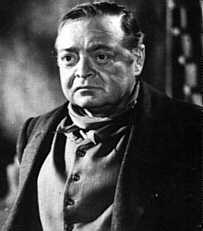 Mystery in the Air was a short-lived horror/mystery replacement series during the summer of 1947. It was hosted by the incomparable Peter Lorre (1904-1964), who also starred in several of the episodes. “The Marvelous Barrastro” (adapted from the Ben Hecht story and performed before a live audience) features Lorre in the lead role as a hypnotist/magician of an eastern European traveling carnival–the proto-typical band of gypsies, as it were. Lest we reveal too much, suffice it to say that this emotionally heart-wrenching tale centers on both Lorre’s character and the young, innocent, blind woman who has fallen in love with him–who is not without a special talent of her own. Another man (a beguiling and rival hypnotist) enters the scene, insinuates himself into the lives of the happy newlyweds for nefarious purposes, and drives both the bride and “The Marvelous Barrastro” into emotional ruin. The denouement is unexpected and chilling. You won’t soon forget this one, especially those of you with significant others or spouses, who entertain the thought of befriending that handsome young man or beautiful young woman you may meet, and welcome into your lives, as “just a friend.”
Mystery in the Air was a short-lived horror/mystery replacement series during the summer of 1947. It was hosted by the incomparable Peter Lorre (1904-1964), who also starred in several of the episodes. “The Marvelous Barrastro” (adapted from the Ben Hecht story and performed before a live audience) features Lorre in the lead role as a hypnotist/magician of an eastern European traveling carnival–the proto-typical band of gypsies, as it were. Lest we reveal too much, suffice it to say that this emotionally heart-wrenching tale centers on both Lorre’s character and the young, innocent, blind woman who has fallen in love with him–who is not without a special talent of her own. Another man (a beguiling and rival hypnotist) enters the scene, insinuates himself into the lives of the happy newlyweds for nefarious purposes, and drives both the bride and “The Marvelous Barrastro” into emotional ruin. The denouement is unexpected and chilling. You won’t soon forget this one, especially those of you with significant others or spouses, who entertain the thought of befriending that handsome young man or beautiful young woman you may meet, and welcome into your lives, as “just a friend.”
Peter Lorre was born László Löwenstein in Rosenburg, Hungary. At seventeen he ran away from home to join a Viennese acting troupe (echoes of which can be found in this radio drama). He traveled with it for seven years. After arriving in America and appearing in several classic movies (Casablanca, The Maltese Falcon, and the earlier M but three of many) he became lifelong friends with fellow horror icons Bela Lugosi, Boris Karloff, and Vincent Price. At Lugosi’s (October 20, 1882–August 16, 1956) funeral, upon gazing into the open casket where Lugosi was draped in his famous Dracula cape, Lorre turned to Price and muttered, “Do you think we should drive a stake through his heart just in case?” Covering the grief for his close friend with a jest, of course. Vincent Price read the eulogy at Lorre’s funeral in 1964.
“The Marvelous Barrastro” aired on August 7, 1947. Astute listeners will recognize the voice of the narrator as that of Henry “Harry” Morgan. Morgan’s radio, tv, and wide screen credits are far too numerous to mention here, but he is probably most familiar as one of several of Sergeant Joe (Jack Webb) Friday’s partners on tv’s Dragnet, and even more recognizable and memorable as Colonel Sherman Potter on tv’s long-running, award-winning series M*A*S*H.
Interesting of historical note is that “The Marvelous Barrastro” was earlier dramatized on Suspense on April 13, 1944, and starred the legendary Orson Welles in the lead role. While we have the highest regard for Mr. Welles, this particular role did not suit him well. His accent, so obviously stilted and phony (it was truly painful to listen to), did him no favors, and serves only to highlight Lorre’s performance in this later and much more successful dramatization, which far outshines that of the legendary Mr. Welles when put side by side.
While post-WW II America settled in to a semblance of normalcy during the early months of 1947, SF fans were enjoying their usual beyond-the-normal fix with stories such as Isaac Asimov’s “Little Lost Robot” (Astounding Science Fiction, March), T. L. Sherred’s brilliant “E for Effort” (ASF, May), and Jack Williamson’s equally brilliant and classic “With Folded Hands” (ASF, July).
A few of 1947’s notable novels (some serialized years before in the magazines, but never in book form) include Ray Bradbury’s Dark Carnival, John W. Campbell, Jr.’s The Mightiest Machine, and George O. Smith’s Venus Equilateral.
Here then is Peter Lorre, cast superbly in the lead role as… “The Marvelous Barrastro.”
Play Time: 28:59